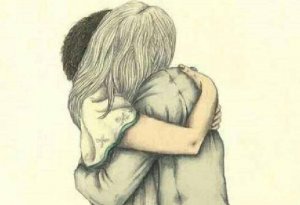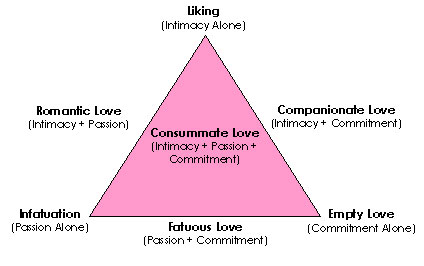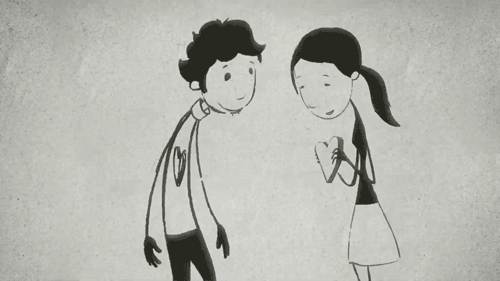Love Is the Most Important Lesson You Can Learn

Almost everyone acts like love isn’t learned, like it lies dormant in every human being, simply waiting to be awoken when the circumstances are ideal for it to flourish.
Everybody experiences love in their own limited way, and they don’t seem to connect their loneliness and confusion to their lack of knowledge about it. It’s like they don’t even realize that you can’t fully experience something that you’re not dedicated to. And in order to dedicate yourself to love, you must always be growing.
“We come to love not by finding a perfect person, but by learning to see an imperfect person perfectly.”
-Sam Keen-
Living life like a person in love

Love through a psychological perspective
Love is an emotion. It’s the affection that you feel for someone or something. But there are many faces of love. It can influence behavior, actions, and change in people who feel it and nurture it.
According to psychology and the Triangular Theory of Love by Robert Sternberg, love has three fundamental components: intimacy, passion, and commitment.
- Intimacy in a relationship can be understood as a set of feelings that promote closeness, bonding, connection, sharing good times together, telling each other things in confidence, giving each other gifts, etc. It’s related to the friendship within the relationship.
- Passion is an intense desire for union with the other person, such as the expression of sexual or romantic needs accompanied by psychological arousal.
- Commitment is choosing to love the other person and firmly maintaining the relationship. It involves staying devoted to the relationship through both the good and the bad times.
Types of interpersonal love according to Sternberg
Based on these 3 components and various combinations of them, Sternberg identifies 7 types of love:

Loving life
Love can be felt towards friends, families, partners, and even life.
Erich Fromm, psychoanalyst, social psychologist, and philosopher, discussed this subject in his book, The Art of Loving, where he reflected on what it means to love life.
The tragedy, according to Fromm, is that most of us die before we start to live. Fromm’s work consists of philosophizing on concrete things, accepting the limitations of abstract thought, and renouncing any kind of messianic attitude. Based on the Jewish oral tradition, this book is full of sharp and profound reflections. The author reveals his particular talent for explaining things that seem confusing and surprising us with his brilliant explanations.
Who teaches us to love?
We’re all born with the potential to love and the need to be loved, but not everybody can do it. It needs to be evoked, studied, taught, and practiced. But how do you learn how to love? This is determined by the culture in which one grows up, the family one belongs to, the people in one’s life, the experiences one has…
So who teaches us? Society, experiences, parents…Our parents are our first teachers, although they’re not always the best ones. Children grow up thinking their parents are perfect, and then later become disappointed and angry when they find out that they’re human beings who make mistakes.

Most people never learn how to love, although there is limitless potential for it in every person, anxious to be recognized, eager to be developed, longing to grow. It’s never too late to learn something if the potential is there.
There’s no word that carries enough meaning to even begin to describe the fullness of a human being. There are too many beautiful qualities in every person for us to be labeled and boxed in without further thought.
Courses on love
Leo Buscaglia was a professor of special education at the University of Southern California and the author of various books. He taught quite a unique course at USC: a course on love. He said that it love must be learned and exercised.
A course like that seems ideal, but even more than that, it’s become necessary. Buscaglia has always insisted that love is a real life choice, whose alternative is frustration, loneliness, and fear. In his books, he teaches us to think, feel, and act in ways that can help us grow and experience everything life has to offer. Beyond just a style of love, what he proposes is a style of life.
Learn to love
If you stop and think about how you’re feeling, you might notice that you need to brush up on your skills. It’s never too late to learn new methods and to feel better about yourself. To learn how to love, start by:
- Recognizing your own needs and going over your style of love. Loving people don’t neglect their own needs. Not so much physical needs, which tend to be mostly covered, but emotional needs: the need to be seen, to be understood, to be respected, to be successful, to enjoy the world, to admire the endless wonders of life, to know how fantastic it is to be alive. Sometimes we forget to look at ourselves, listen to ourselves, and hug ourselves.
- Loving yourself. Living a life of love involves loving yourself and understanding that you can only offer what you have and what you know. Take care of yourself so that you can grow, love, and treasure your wisdom and experiences, and then later you can give it all back to others in a way that they can integrate and build upon it.
- Taking care of your partner, your family, your friends, and other people in general. Pay attention to the little details: a phone call, a bit of your time, a smile. Giving these little gifts is caring, and caring is loving.
- Letting your heart guide you, without losing your sense of reason. Love can benefit from serious study, analysis, and learning. Knowing yourself, your essence, and your desires, and reading authors who have reflected on this topic can help you learn how to love.

“The great tragedy of life is not that men perish, but that they cease to love.”
-W. Somerset Maugham-
Almost everyone acts like love isn’t learned, like it lies dormant in every human being, simply waiting to be awoken when the circumstances are ideal for it to flourish.
Everybody experiences love in their own limited way, and they don’t seem to connect their loneliness and confusion to their lack of knowledge about it. It’s like they don’t even realize that you can’t fully experience something that you’re not dedicated to. And in order to dedicate yourself to love, you must always be growing.
“We come to love not by finding a perfect person, but by learning to see an imperfect person perfectly.”
-Sam Keen-
Living life like a person in love

Love through a psychological perspective
Love is an emotion. It’s the affection that you feel for someone or something. But there are many faces of love. It can influence behavior, actions, and change in people who feel it and nurture it.
According to psychology and the Triangular Theory of Love by Robert Sternberg, love has three fundamental components: intimacy, passion, and commitment.
- Intimacy in a relationship can be understood as a set of feelings that promote closeness, bonding, connection, sharing good times together, telling each other things in confidence, giving each other gifts, etc. It’s related to the friendship within the relationship.
- Passion is an intense desire for union with the other person, such as the expression of sexual or romantic needs accompanied by psychological arousal.
- Commitment is choosing to love the other person and firmly maintaining the relationship. It involves staying devoted to the relationship through both the good and the bad times.
Types of interpersonal love according to Sternberg
Based on these 3 components and various combinations of them, Sternberg identifies 7 types of love:

Loving life
Love can be felt towards friends, families, partners, and even life.
Erich Fromm, psychoanalyst, social psychologist, and philosopher, discussed this subject in his book, The Art of Loving, where he reflected on what it means to love life.
The tragedy, according to Fromm, is that most of us die before we start to live. Fromm’s work consists of philosophizing on concrete things, accepting the limitations of abstract thought, and renouncing any kind of messianic attitude. Based on the Jewish oral tradition, this book is full of sharp and profound reflections. The author reveals his particular talent for explaining things that seem confusing and surprising us with his brilliant explanations.
Who teaches us to love?
We’re all born with the potential to love and the need to be loved, but not everybody can do it. It needs to be evoked, studied, taught, and practiced. But how do you learn how to love? This is determined by the culture in which one grows up, the family one belongs to, the people in one’s life, the experiences one has…
So who teaches us? Society, experiences, parents…Our parents are our first teachers, although they’re not always the best ones. Children grow up thinking their parents are perfect, and then later become disappointed and angry when they find out that they’re human beings who make mistakes.

Most people never learn how to love, although there is limitless potential for it in every person, anxious to be recognized, eager to be developed, longing to grow. It’s never too late to learn something if the potential is there.
There’s no word that carries enough meaning to even begin to describe the fullness of a human being. There are too many beautiful qualities in every person for us to be labeled and boxed in without further thought.
Courses on love
Leo Buscaglia was a professor of special education at the University of Southern California and the author of various books. He taught quite a unique course at USC: a course on love. He said that it love must be learned and exercised.
A course like that seems ideal, but even more than that, it’s become necessary. Buscaglia has always insisted that love is a real life choice, whose alternative is frustration, loneliness, and fear. In his books, he teaches us to think, feel, and act in ways that can help us grow and experience everything life has to offer. Beyond just a style of love, what he proposes is a style of life.
Learn to love
If you stop and think about how you’re feeling, you might notice that you need to brush up on your skills. It’s never too late to learn new methods and to feel better about yourself. To learn how to love, start by:
- Recognizing your own needs and going over your style of love. Loving people don’t neglect their own needs. Not so much physical needs, which tend to be mostly covered, but emotional needs: the need to be seen, to be understood, to be respected, to be successful, to enjoy the world, to admire the endless wonders of life, to know how fantastic it is to be alive. Sometimes we forget to look at ourselves, listen to ourselves, and hug ourselves.
- Loving yourself. Living a life of love involves loving yourself and understanding that you can only offer what you have and what you know. Take care of yourself so that you can grow, love, and treasure your wisdom and experiences, and then later you can give it all back to others in a way that they can integrate and build upon it.
- Taking care of your partner, your family, your friends, and other people in general. Pay attention to the little details: a phone call, a bit of your time, a smile. Giving these little gifts is caring, and caring is loving.
- Letting your heart guide you, without losing your sense of reason. Love can benefit from serious study, analysis, and learning. Knowing yourself, your essence, and your desires, and reading authors who have reflected on this topic can help you learn how to love.

“The great tragedy of life is not that men perish, but that they cease to love.”
-W. Somerset Maugham-
This text is provided for informational purposes only and does not replace consultation with a professional. If in doubt, consult your specialist.







